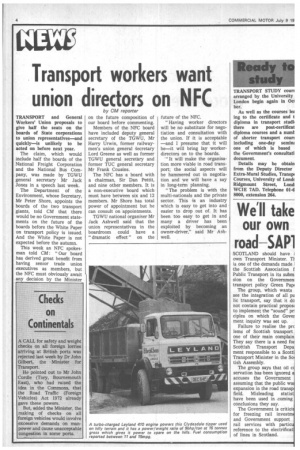Transport workers want union directors on NFC
Page 6

If you've noticed an error in this article please click here to report it so we can fix it.
by OM reporter
TRANSPORT and General Workers' Union proposals to give half the seats on the boards of State corporations to union representatives—and quickly—is unlikely to be acted on .before next year.
The claim, which would include half the boards of the National Freight Corporation and the National Bus Company, was made by TGWU general secretary • Mr Jack Jones in a speech last week.
The Department of the 'Environment, whose Secretary, Mr Peter Shore, appoints the boards of the two transport giants, told CM that there would be no Government statements on the future of the boards before the White Paper on transport policy is issued. And the White Paper is not expected before the autumn.
This week an NFC spokesman told CM: "Our board has derived great benefit from having senior trade union executives as members, but the NFC must obviously await any decision by the Minister on the future composition of our board before commenting.
Members of the NEC board have included deputy general secretary of the TGWU, Mr Harry Urwin, former railwaymen's union general Secretary Lord Greene as well as former TGWU general secretary and former TUC general secretary Mr Frank Cousins.
The NFC has a board with a chairman, Sir Dan Pettit, and nine other members. It is a non-executive board which must have between six and 12 members. Mr Shore has total power of appointment but he can consult on appointments.
TGWU national organiser Mr Jack Ashwell said that the union representatives in the boardroom could have a "dramatic effect" on the future of the NFC.
"Having worker directors will be no substitute for negotiation and consultation with the union. If it is acceptable —and I presume that it will be—it will bring lay workerdirectors on to the boards.
• " It will make the organisation more viable in road transport; the social aspects will be hammered out in negotiation and we will have a say in long-term planning.
"The problem is with the multi-nationals and the private sector. This is an industry which is easy to get into and • easier to drop out of. It has been too easy to get in and many a driver has been exploited by becoming an owner-driver," said Mr Ashwell.




















































































